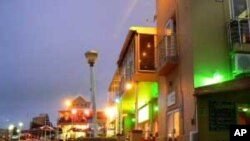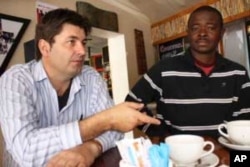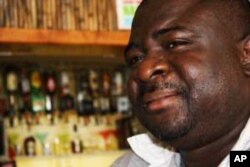A cosmopolitan crowd, dressed in multicolored finery, shimmies the night and early morning hours away in one of the many chic bars that line the street. During breaks from dancing, the sweating, smiling revelers sip at gaudy cocktails and nibble at plates of food.
But the vibe in Parliament Street, one of South Africa’s most historic areas, in the coastal city of Port Elizabeth – wasn’t always as “fantastic” as this, says Etienne Barkhuysen, owner of a local coffee shop.
Up until recently, businesses like his had to shut their doors long before midnight because of the threat of armed robbers. Drug dealers and prostitutes lined Parliament Street – named in the 1800s after it hosted the first sitting of the Cape Province parliament. Young men, fueled by alcohol consumed in their parked cars, battled one another with bottles and fists in vicious street fights. The once vibrant, multiracial, multicultural restaurants, nightclubs and bars closed, relocating to safer, cleaner areas. Economic stagnation hung heavy over the area.
But now, although signs of the previous decay are still evident, the “boom times” are back for Parliament Street, Barkhuysen says enthusiastically. Businesses have reopened. The streets are no longer littered with broken glass, blood and used condoms. Instead, they’re lined with flowering plants and sparkling new signs advertising parties. People in search of entertainment throng the venue nightly, no longer afraid of criminals.
Central to the rejuvenation of Parliament Street is a group of Nigerian immigrants, who took action when locals accused Nigerian criminals of turning the area into a no-go zone.
‘Amazing’ Nigerians ‘clean up the street’
In an initial attempt to manage the crisis, owners of businesses hired private security officers to patrol the street. But the crime continued. “There were some muggings and stuff,” says Barkhuysen. “But the biggest problem was people running after cars, jumping in, trying to sell drugs. A lot of people felt threatened by it; they felt they were being hijacked. And also people in the street being grabbed and (offered) drugs…. Unfortunately, a lot of the crime was being perpetrated by Nigerians.”
Barkhuysen, as chairman of the Parliament Street Business Forum, approached some “respected” Nigerians who also owned enterprises in the vicinity, in a final bid for help to stop the chaos.
“When people started running away from Parliament Street, it didn’t only affect the white (South African) business owners; it also affected the Nigerians that owned businesses in this area,” says Chukwudi Obiezu, a Nigerian entrepreneur.
“So we had to get involved,” says the burly man, who’s also chairman of the Port Elizabeth branch of the Nigerian Union of South Africa, an organization formed to support Nigerians living in Africa’s largest economy. “We became sick and ashamed of always hearing that it was Nigerians doing these terrible deeds,” he says.
Barkhuysen credits Obiezu and his Nigerian partners for “cleaning up” the street. “They were amazing,” says the South African. “They turned things around very fast.” Obiezu adds, “If you’re coming around and we see you doing (crime), we get you and we hand you over to the police – whether you’re a Nigerian or not.”
But sometimes the Nigerian Union’s intervention involves far more than a simple “hand-over” of a suspect to the authorities…. Sometimes, says Obiezu, he and his fellow crime fighters have to get “heavy handed” with alleged criminals.
Nigerian crime fighters ‘go above the law’…. But crime continues
A Parliament Street restaurateur, who wants to remain anonymous, comments, “The Nigerian Union guys don’t mess around. If they catch a criminal, they don’t play. They are very ruthless – especially if the suspect’s one of their own nationals who is dirtying their names with crime….”
Obiezu acknowledges that he and his colleagues “fight fire with fire” in their war against criminal gangs in Parliament Street.
“You don’t take a knife to a gunfight,” he says, a steely look of resolve hardening his eyes. “Sometimes talking does nothing.”
Obiezu continues, “To an extent, we were able to convince the police to let us clean our own people our own way. So the police gave us just a little power – more than what we should have. The police allow us to use a bit of force. We are allowed to go a little bit above the law, to weed the bad eggs out. And when the criminals experience this, they run like the cowards they actually are.”
But some drug dealers haven’t “run.” When VOA visited the area, we were approached by a young man who identified himself as “Mike.” He said he was “from Lagos.” In the sheltered darkness of an abandoned building, “Mike” displayed an assortment of narcotics – including cocaine, ecstasy and marijuana – and offered the drugs for sale.
According to veteran Parliament Street security guard Mary Van Rensburg, the district’s still “far from safe. Sometimes in the night, things are very bad here. People are getting robbed here,” she says. Van Rensburg herself has fallen victim to the criminals. “Two young men and a grey-haired old man took my money. They had knives,” she recalls. “They caught me off-guard….”
But Van Rensburg maintains that “by far” the biggest problem in Parliament Street remains drug dealing. She voices no doubt as to who the perpetrators are. “The Nigerian criminals are still here,” she says, whispering. “It’s them who bring in the drugs.”
The neon-bibbed security guard says she witnesses Nigerian criminals doing “very terrible things.
But I keep my mouth shut. I am very scared of the Nigerians. They are a very vicious nation. If you tell the police about them, they will hurt you.”
‘We are not drug dealers, we are businessmen’
Another Nigerian, Sunday Smith, manages a store near Parliament Street. He agrees with Van Rensburg that crime still happens in the precinct but insists that “compared to what it was like in the past, this place is heaven.” He points to a shiny new boutique hotel in the street and says “it wouldn’t be here if things were as bad” as Van Rensburg says.
And he’s offended by her contention that only Nigerians are responsible for drug peddling in the area and that Nigerians in general are “vicious.”
“Prejudice” such as this on the part of many South Africans against Nigerians, he says, makes him “shed tears.”
“Most Nigerians in South Africa, we are not drug dealers; we are businessmen, even professionals, like doctors. But when South Africans hear you are a Nigerian, you can see the suspicion in their eyes. They automatically think, ‘Ah, this man, he is a drug man….’”
Folorunsho Jafoluwa is a lawyer and a Nigerian resident of Port Elizabeth. Despite this, he says he’s regularly confronted by South Africans convinced he’s a drug dealer – simply because he’s Nigerian. “They even ask me for drugs!” he says, laughing. “I tell them, ‘I’ve not ever seen drugs, not even in Nigeria; how can you think I know what do to sell you drugs?’ But they never believe me; they just smile and carry on asking me for drugs.”
Obiezu insists that many drug criminals in the country – and in Parliament Street specifically – are not Nigerians. “So many black foreign criminals hide under the cloak of being Nigerian. And to the South Africans, if you are a black foreign African, you are simply called ‘a Nigerian.’ That is how we have come to have such a bad reputation,” he says.
Obiezu adds that Nigerians’ “natural flamboyance” make them “easy targets” to blame for crime. “We are very loud, and also built very big. We have very dark skin. If two or three Nigerians stand together, we look like a big crowd, very threatening,” he explains.
For some, unemployment leads to crime
Smith acknowledges the presence of some “bad eggs” in the Nigerian community in South Africa. He says young Nigerians continue to “stream” into the country. “Some of them are cobblers; some of them are mechanics…. They can’t get jobs, so big time criminals recruit them to sell drugs on the streets.”
Smith’s comments raise another issue that concerns the Nigerian Union and, according to Obiezu, is responsible for some Nigerians in South Africa turning to crime.
“There are over 300 qualified Nigerian medical doctors in South Africa. But bureaucracy means they are not being issued work permits. How are such people supposed to survive?” he asks, continuing, “You get married to a South African. You are given a permit to reside in South Africa for two years. But under that permit, you are prohibited from working. Is that not a ticket to go into crime?”
For Obiezu and many other Nigerians in South Africa, the struggle to be recognized as valuable members of society in the country where they’ve chosen to settle endures. But, on this street in Port Elizabeth, they have plenty of supporters and admirers.
“The fact that I and other South Africans in Parliament Street are now able to make a decent living here is largely because of Nigerians,” says Etienne Barkhuysen. “I hope others realize that, when they are so quick to condemn the Nigerian presence in South Africa.”








